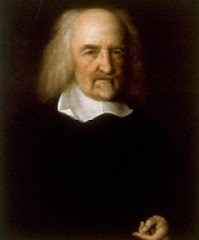Sunday, April 27, 2008
Hobbes on human nature
Would you characterize Hobbes's view of human nature as pessimistic, or merely realistic? Although he seems to adopt something like the later Bentham's "predominant egoism", he also acknowledges humans' tendency to form "transcendent interests", interests in the service of which they are willing to risk death , or embrace death. If the goal of political philosophy is to display, as Rawls insisted, a realistic utopia, can Hobbes's conception of human nature be a building block in anyb realistic utopia?
Could a system of divided and limited government count as a Hobbesian sovereign?
Certainly. Hobbes offers a functional definition of a sovereign as an authoritiative public judgment to resolve all disputes and enforce those decisions. Experience proves that a mixed and tempered system may serve that function. Even so, we should keep in mind that the American experiment had not lasted 100 years before it imploded into civil war. Was Hobbes right that these mixed systems are less stable?
Tuesday, April 1, 2008
Lessons from a Materialist Thinker

“This is an intensively philosophical book that speaks importantly to issues in the philosophy of mind, of action, and of responsibility. The author is fully conversant with Cartesian and post-Cartesian anti-materialism and has a refined and complex understanding of the Hobbesean alternative to it. As the term "lessons" indicates, Frost aims to help us escape from Cartesian ways of thinking and to move us to a sense of ourselves and one another as material, embodied beings who can and should relate to one another in sinuous but mutually productive ways." —Richard Flathman, The Johns Hopkins University
View this book.
Hobbesian Moral and Political Theory

Both conflict and cooperation are ubiquitous features of human social life. Interests of individuals conflict with those of their neighbors because (among other reasons) material resources are scarce, ideals and values are diverse, and people care about their reputations and relative standing among their fellows. At the same time, individuals share a number of common interests and concerns, and this makes social cooperation possible. Among the most important of these common interests are the prevention and limitation of violent conflict and the protection of personal possessions. When these interests are secured and when environmental and economic conditions are reasonably favorable, people generally can live out their lives and engage in cooperative (and competitive) social activities without constant concern for their own survival and that of their loved ones. But it is not easy to secure persons and possessions when others may gain by attacking the former or seizing the latter. In fact, it requires two major social institutions--morality and government--working in a coordinated fashion to do so. This is one of the main themes of Hobbes's philosophy that will be developed in this book. -- Gregory S. Kavka
View this book.
Hobbes: A Biography

Hobbes's position as one of the founders and leading theorists of modern political philosophy has been established for some time. His connections with leading thinkers of his day, as well as his investigations in such fields as mathematics, physics, and religion, have placed him in the forefront of modern philosophy. Martinich's biography, one of the most accessible and thoroughly researched of recent years, delves into the motivations behind Hobbes's ideas, the events and people that influenced him, and the significance of his ideas for contemporary thought. At the same time, it shows him to have been a far wider-ranging thinker than may previously have been realized. Martinich's writing style is clear, and his exposition of Hobbes's thought is well within the reach of most readers, even those who do not have an extensive grounding in political theory or philosophy. Written by a Hobbes expert (e.g., A Hobbes Dictionary, Blackwell, 1995), this biography should serve most libraries well and should certainly be a part of any political theory or political philosophy collection. -- Terry C. Skeats, Bishop's Univ. Lib., Lennoxville, Quebec Copyright 1999 Reed Business Information, Inc.
View this book.
Two Gods of Leviathan

As well as being considered the greatest English political philosopher, Hobbes has traditionally been thought of as a purely secular thinker, highly critical of all religion. In this provocative new study, Professor Martinich argues that conventional wisdom has been misled. In fact, he shows that religious concerns pervade Leviathan and that Hobbes was really intent on providing a rational defense of the Calvinistic Church of England that flourished under the reign of James I. Professor Martinich presents a close reading of Leviathan in which he shows that, for Hobbes, Christian doctrine is not politically destabilizing and is consistent with modern science.
View this book.
Ideals as Interests: The Power of Mind Over Matter (Lloyd)

S. A. Lloyd proposes a radically new interpretation of Hobbes's Leviathan that shows transcendent interests--interests that override the fear of death--to be crucial to both Hobbes's analysis of social disorder and his proposed remedy to it. Most previous commentators in the analytic philosophical tradition have argued that Hobbes thought that credible threats of physical force could be sufficient to deter people from political insurrection. Professor Lloyd convincingly shows that because Hobbes took the transcendence of religious and moral interests seriously, he never believed that mere physical force could ensure social order. Lloyd's interpretation demonstrates the ineliminability of that half of Leviathan devoted to religion, and attributes to Hobbes a much more plausible conception of human nature than the narrow psychological egoism traditionally attributed to Hobbes.
View this book.
Subscribe to:
Comments (Atom)
